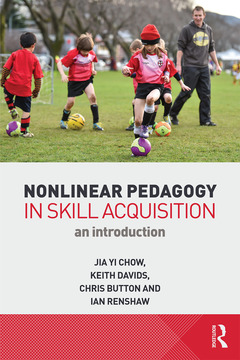Nonlinear Pedagogy in Skill Acquisition An Introduction
Auteurs : Chow Jia Yi, Davids Keith, Button Chris, Renshaw Ian

Nonlinear pedagogy is a powerful paradigm for understanding human movement and for designing effective teaching, coaching and training programs in sport, exercise and physical education. It addresses the inherent complexity in the learning of movement skills, viewing the learner, the learning environment and the teacher or coach as a complex interacting system, with the constraints of individual practice tasks providing the platform for functional movement behaviours to emerge. This is the first book to explain this profoundly important new approach to skill acquisition, introducing key theoretical ideas and best practice for students, teachers and coaches.
The first section of the book offers a general theoretical framework to explain processes of skill acquisition and the learning of movement skills. The book then defines nonlinear pedagogy, and outlines its key principles of practice. It offers a thorough and critical appraisal of the optimal use of instructional constraints and practice design, and discusses methods for creating challenging and supportive individualised learning environments at developmental, sub-elite and elite levels of performance. Every chapter contains cases and examples from sport and exercise contexts, providing guidance on practice activities and lessons. Nonlinear Pedagogy in Skill Acquisition is an essential companion for any degree level course in skill acquisition, motor learning, sport science, sport pedagogy, sports coaching practice, or pedagogy or curriculum design in physical education.
1. Overview and introduction to skill performance and learning 2. (Re)organising movement system degrees of freedom to achieve task goals 3. An Ecological Dynamics rationale for a Nonlinear Pedagogy 4. Nonlinear Pedagogy: An Overview of Key principles 5. The role of functional, adaptive variability in promoting individualized learning 6. Specificity of transfer and representative learning design 7. Provision of information to stabilize perception-action couplings 8. Manipulating instructional constraint to encourage exploratory learning 9. Practice Task Organisation and Movement Variability 10. Practice Task Organisation and Movement Variability 11. Why do we do what we do?: Applications of a Nonlinear Pedagogy in Physical Education and Sport Contexts 12. The Motivational Impact of Nonlinear Pedagogy 13. Emotions of learning in a Nonlinear Pedagogy perspective
Jia Yi Chow is currently the Assistant Dean (Degree Programme) at the Office of Teacher Education and a member of staff at the Physical Education and Sports Science Academic Group at the National Institute of Education, Nanyang Technological University, Singapore. His primary research area is in nonlinear pedagogy, which is underpinned by key theoretical perspectives from dynamical systems and ecological psychology. His other research interests include examining multi-articular coordination and visual search strategies captured within sports expertise. Jia Yi works closely with the Physical Education and Sports Teachers Academy (PESTA) at the Ministry of Education, Singapore, and also the Singapore Sports Institute.
Keith Davids is Professor of Motor Learning at the Centre for Sports Engineering Research, Sheffield Hallam University, UK. He currently holds the position of Finnish Distinguished Professor at the Faculty of Sport and Health Sciences, University of Jyväskylä, Finland. He has held professorial positions in the UK, New Zealand, Australia and Finland. His research in ecological dynamics investigates constraints on emergent coordination tendencies in athletes and sports teams. These key ideas have been integrated into a nonlinear pedagogy, informed by his work on motor learning design in sport. He currently supervises doctoral students from the UK, France, Finland, Portugal, Australia and New Zealand. He has worked with elite sport development agencies including the New Zealand South Island Academy, the Queensland Academy of Sport, the Australian Institute of Sport, Diving Australia, Cricket Australia and the English Institute of Sport.
Chris Button works at the School of Physical Education, Sport and Exercise Sciences, University of Otago in Dunedin, New Zealand. His research interests include fundamental movement skill development and water safety. Chris also coache
Date de parution : 11-2015
15.6x23.4 cm
Disponible chez l'éditeur (délai d'approvisionnement : 14 jours).
Prix indicatif 50,12 €
Ajouter au panierDate de parution : 12-2015
15.6x23.4 cm
Disponible chez l'éditeur (délai d'approvisionnement : 14 jours).
Prix indicatif 172,36 €
Ajouter au panierThèmes de Nonlinear Pedagogy in Skill Acquisition :
Mots-clés :
task; constraints; movement; patterns; pedagogical; approach; manipulating; intrinsic; dynamics; solutions; Nonlinear Pedagogy; Movement Pattern Variability; Vice Versa; Field Hockey; Perceptual Motor Workspace; Manipulating Task Constraints; Functional Movement Solution; Ball Projection Machine; Student Centred Learning Process; Nonlinear Pedagogical Approach; Task Constraints; Human Movement Systems; Key Pedagogical Principles; Information Movement Coupling; Perceptual Motor Landscape; Practice Task Design; Preferred M



